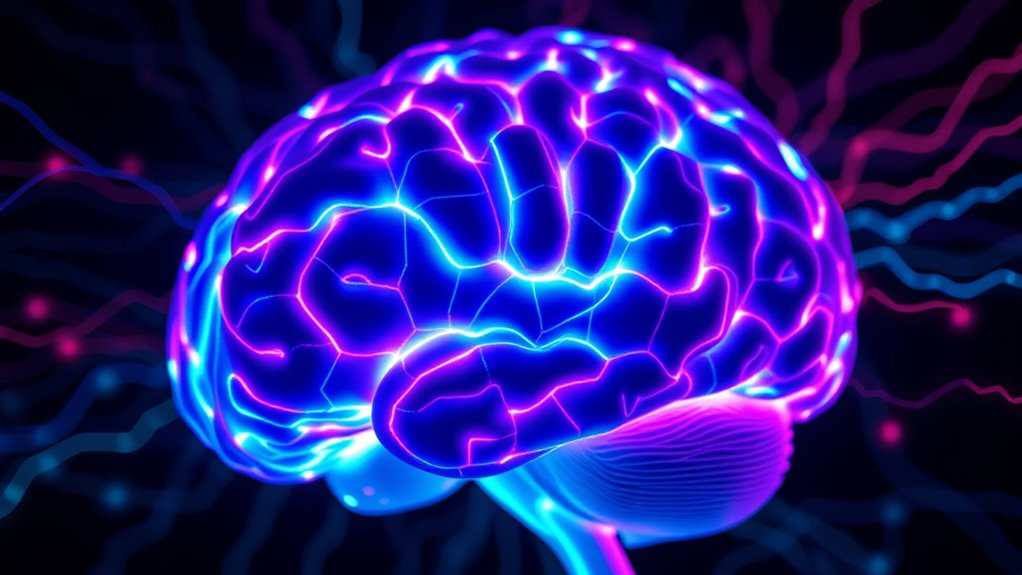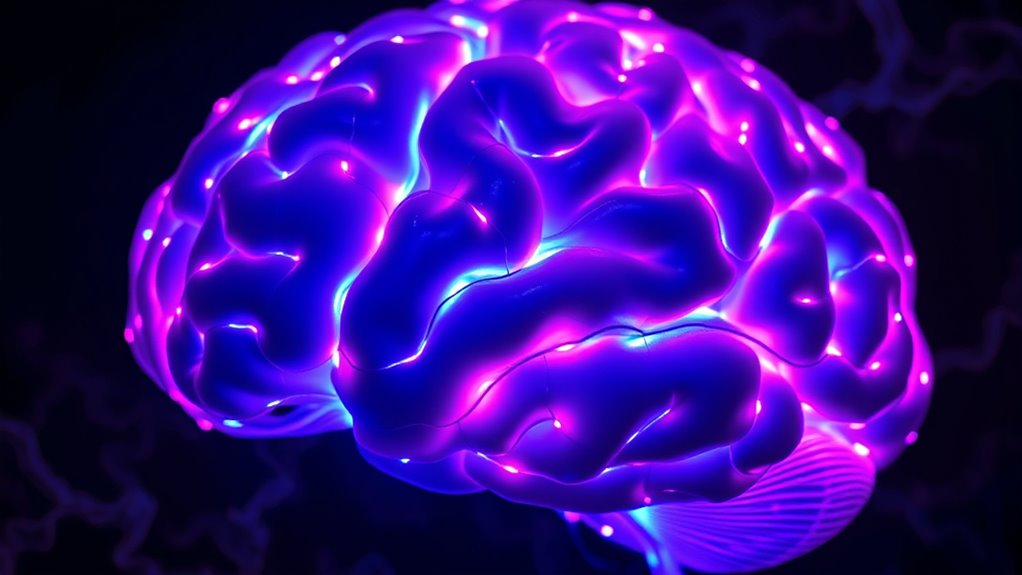Recent findings show that sex addiction involves dopamine pathways in your brain becoming overstimulated, driving the compulsive pursuit of sexual activity despite negative effects. Triggers and cues become linked to gratification, strengthening these pathways and making it harder to resist urges. Overactivation reduces your impulse control, keeping you stuck in a cycle of craving and reward. Understanding these neurochemical changes can help you discover strategies to regain control and recover more effectively. Keep exploring to learn how the brain adapts and heals.
Key Takeaways
- Sex addiction involves overstimulation of dopamine pathways, reinforcing compulsive sexual behaviors through reward and craving cycles.
- Triggers and cues associated with sexual activity activate the brain’s reward system, prompting automatic cravings.
- Neurochemical overactivation diminishes impulse control, making it difficult to resist urges despite negative consequences.
- Repeated exposure sensitizes dopamine pathways, strengthening trigger responses and perpetuating compulsive behaviors.
- Treatment aims to rebalance neurochemical pathways, reduce triggers, and improve impulse control for recovery.

Have you ever wondered what happens in the brain when someone develops a sex addiction? It all comes down to complex neurochemical pathways that get hijacked by intense urges and compulsive behaviors. When you engage in sexual activities that feel rewarding, your brain releases a flood of dopamine, the neurotransmitter associated with pleasure and motivation. In someone with a sex addiction, these neurochemical pathways become overstimulated, creating a cycle where the brain craves more to achieve the same high. This heightened dopamine response reinforces the behavior, making it difficult to resist the urge to seek out sexual activities even when they start causing harm.
Sex addiction involves overstimulated dopamine pathways that reinforce compulsive sexual behavior despite harm.
As your brain learns to associate certain stimuli or environments with sexual gratification, behavioral triggers emerge. These triggers can be anything from specific locations, emotional states, or even particular times of day that have become linked to the addictive behavior. Once these triggers are identified, they act as cues that activate the brain’s reward system, prompting you to pursue sex compulsively. Over time, these triggers can become deeply ingrained, leading to a pattern where the brain automatically responds with craving and anticipation whenever faced with these cues, regardless of whether the behavior is healthy or appropriate.
The key to understanding sex addiction lies in recognizing how neurochemical pathways influence behavior. When the dopamine system is overactivated, it can overshadow the brain’s natural judgment and impulse control. This means you might find yourself engaging in sex despite negative consequences, simply because your brain is driven by the urge to restore that dopamine high. furthermore, repeated exposure to sexual stimuli can sensitize these pathways, making the triggers even more potent and harder to resist. The more you indulge, the stronger the connection becomes, creating a vicious cycle that feeds into compulsive behavior.
In essence, sex addiction isn’t just about moral failure or lack of willpower. It’s rooted in neurobiological changes that alter how your brain processes pleasure, motivation, and triggers. Recognizing the role of neurochemical pathways and behavioral triggers can help you understand why resisting the urge is so challenging. It also highlights the importance of targeted treatment strategies, such as therapy and medication, aimed at rebalancing these pathways and reducing the power of triggers. By addressing the brain’s chemistry and the behavioral patterns linked to it, recovery becomes a more attainable goal, giving you a chance to regain control over your life.
Frequently Asked Questions
Can Sex Addiction Be Cured Without Therapy?
You can’t typically cure sex addiction without therapy because neurochemical pathways involved in addiction require professional support. Therapy helps you understand triggers, develop coping skills, and rewire your brain for healthier behavior, which is essential for addiction recovery. While lifestyle changes like exercise or mindfulness might help, they alone won’t address the underlying neurochemical imbalances. For lasting change, combining therapy with other strategies is the most effective approach.
How Does Genetics Influence Sex Addiction Risk?
Genetics can greatly influence your risk of sex addiction by shaping your susceptibility through genetic predisposition and dopamine genetics. If your family has a history of addictive behaviors, you might be more prone to develop compulsive tendencies. Variations in dopamine genes can impact how you experience pleasure and reward, making you more vulnerable to seeking out risky behaviors. Understanding your genetic makeup can help you recognize and manage these tendencies proactively.
Are There Medications Effective for Sex Addiction Treatment?
Yes, some pharmacological interventions show promise for sex addiction treatment. Medications like SSRIs and anti-androgens can help reduce compulsive behaviors, but their efficacy varies. You should discuss with a healthcare professional to determine if medication is appropriate for your situation, as overall medication efficacy depends on individual factors. Combining medication with therapy often yields the best results for managing sex addiction effectively.
What Role Does Childhood Trauma Play in Sex Addiction?
Childhood trauma can profoundly contribute to sex addiction by impacting your emotional regulation. When you experience trauma, your brain may develop coping mechanisms that involve risky behaviors, like compulsive sex, to seek relief or validation. Focusing on trauma healing helps you process unresolved feelings, improving emotional regulation. This process can reduce reliance on addictive behaviors, empowering you to build healthier patterns and regain control over your life.
How Does Sex Addiction Compare to Other Behavioral Addictions?
You should know that sex addiction shares neurochemical pathways with other behavioral addictions, like gambling or gaming, involving dopamine release that fuels craving and reward. While addiction severity varies, your brain’s response to sex addiction can be equally compelling and disruptive. Recognizing these similarities helps you understand that sex addiction is a complex, brain-based issue, requiring tailored treatment focused on these shared neurochemical mechanisms.
Conclusion
Now that you understand the dance between dopamine and desire, you see how sex addiction shapes your brain’s boundaries. Recognize the risks, resist the rush, and reinforce your resilience. With awareness and action, you can break free from the cycle and regain control. Remember, your brain’s blueprint is changeable—so seize this chance to challenge cravings, channel your choices, and champion your well-being. Your journey from temptation to transformation begins with understanding.









